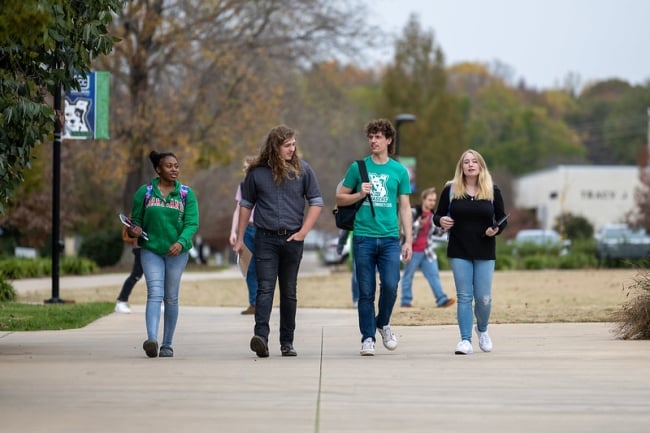You have /5 articles left.
Sign up for a free account or log in.

The American Association of University Professors and the South Carolina Inspector General’s Office recently released reports on Spartanburg Community College.
Spartanburg Community College
Administrators at Spartanburg Community College are under public scrutiny after they disbanded the college’s decade-old Faculty Senate in the spring, replaced it with a new governing body and took a number of ethically questionable steps, prompting investigations by state law enforcement authorities and a national faculty advocacy association.
Both the South Carolina Inspector General’s Office and the American Association of University Professors recently released reports of their findings that highlight additional troubling details about the breakdown of relations between the college’s administrators and faculty members.
The state inspector general report, completed in October, didn’t find the institution in violation of college policies or state laws, but it called out the college for surveilling employee emails, seeking to investigate the senate president and then denying having done so to both Inside Higher Ed and The Post and Courier, which first reported the story. The AAUP report, released today, accuses the administration of an “autocratic style,” “abuses of power” and the “the collapse of meaningful shared governance.”
The AAUP report is based on interviews with 24 faculty members. The college’s administrators chose not to participate.
“The SIG determined SCC issued false statements to the P&C [The Post and Courier], Inside Higher Ed, and the public which created the risk of damage to the reputation of SCC,” Brian Lamkin, the South Carolina inspector general, wrote in his report.
“What happened at Spartanburg involved one of the most egregious steps the administration can take,” said Mark Criley, senior program officer for the Department of Academic Freedom, Tenure and Governance at the AAUP. He called the dissolution of the Faculty Senate “extreme.”
The Spartanburg County Commission for Technical and Community Education, the college’s governing body, provided a statement to Inside Higher Ed saying it had “reviewed allegations leveled against Spartanburg Community College by a small group of faculty members over the last several months,” as well as “correspondence with the College’s accrediting body, SACSCOC, and the South Carolina Inspector General’s Office, both of whom—after comprehensive and detailed investigations—found the majority of the allegations to be unfounded, or unsubstantiated.”
The commission expressed that it “completely and unequivocally supports” the college’s president, Michael Mikota, and his administration.
“Thanks to the dedicated and deliberate work of this team, Spartanburg Community College has not only reached new heights but has also gained regional and national recognition as a leader in driving innovation and enhancing opportunities for higher education and workforce development,” the statement continued.
‘The Collapse of Meaningful Shared Governance’
The AAUP report details how Bruce Dillenbeck, president of the disbanded Faculty Senate and now president of its AAUP chapter, called a meeting for April 10 regarding a controversial policy requiring faculty members to work on campus for a fixed 37.5 hours per week. But the administration blocked the email message he sent inviting faculty members to attend the meeting and vote on whether to formally oppose the policy.
Dillenbeck went ahead with organizing the meeting, but a few hours before it was to take place, Lisa Satterfield, then chief academic officer and vice president of academic affairs and now the college’s provost, sent a facultywide email message announcing that an Academic Council would be created, “in lieu of a Faculty Senate,” because some faculty members were “uncomfortable” with the senate’s current direction.
Dillenbeck and others then formed a college AAUP chapter. After the AAUP urged the college to reinstate the senate, to no avail, it launched an investigation. The report concluded, based on faculty interviews, that seemingly “no legitimate grounds existed for the administration’s drastic action, and the stated rationales for that action are patently insufficient.” It also noted that the new Academic Council is “wholly inadequate” by AAUP standards, given the administration “unilaterally developed” its bylaws and used an “opaque” voting process in which some faculty members had less than 24 hours to give input on nominees, and the council doesn’t include part-time faculty members, among other issues.
Criley said, nationally, campus leaders disbanding faculty senates is uncommon but not unheard-of, with a handful of notable examples over the last couple of decades, though what’s “distinctive” about Spartanburg is that the goal seems to have been to prevent faculty from “offering its opinion on a matter of institutional governance.”
“It appears as an attempt to silence the faculty’s voice,” he said.
The report also highlighted other shared governance and communication problems between faculty members and administrators. For example, faculty members reported their involvement in faculty appointment decisions varied “widely and haphazardly across departments, operating largely at the discretion of the administrators in their divisions.” Linda K. Schmidt, the mathematics department chair and AAUP chapter vice president, also told investigators that Satterfield, the CAO, decided in spring 2023 that math instructors could no longer use instructional software, when instructional technology should be within the realm of faculty decision-making, according to the AAUP.
“That’s what shared governance is really about, is making sure that those different components of an institution are talking with one another, drawing on the expertise and resources that they have available, and appropriately deferring to the judgment of the various components in those areas of expertise,” Criley said. “And when communication breaks down … you’re not going to get the most expert and informed approach to solving institutional problems.”
Dillenbeck said he’s officially retiring in January, in part because he’s tired of the administration.
“All things being equal, had the administration not been so authoritarian and so difficult to work with, I could have finished the year out,” he said. “The idea of working with people like this I just found thoroughly disgusting.”
Accusations Dismissed, Surveillance Covered Up
The South Carolina inspector general report absolves college administrators of having done anything to clearly breach state law or college policies and concluded that Mikota had the right to create the Academic Council in place of the Faculty Senate. But it also uncovered disquieting behavior on the part of administrators, including requesting to see Dillenbeck’s emails on multiple occasions, asking campus police to retrieve campus camera footage of him in order to monitor his past actions on campus and lying about it to media outlets.
According to the report, Satterfield requested Dillenbeck’s 2022 emails from the college’s IT department in April to “to determine information harmful to the college, including references to a faculty walkout in the middle of the semester, a boycott of graduation, or the withholding of grades,” according to the report. She made another request to see his emails from a weeklong period in April and a third request to see his emails dating back to Jan. 1, 2022. She also requested to review emails of a faculty member who had corresponded with Dillenbeck.
Spartanburg officials told media outlets a different version of events.
Colton Grace, college spokesperson, had previously told Inside Higher Ed in an August email that Dillenbeck’s mass message inviting faculty to the April meeting was “flagged due to its potential to further create a hostile work environment,” but the college “does not monitor the email usage of its employees outside of the mass email distribution lists.”
The report says that despite Satterfield’s “knowledge that the reply was false,” she approved Grace’s responses to Inside Higher Ed. She reportedly told the inspector general’s office that she believed the statement to be correct because the “email review did not constitute an investigation.”
Dillenbeck said he and Faculty Senate members had no plans to stage a walkout or graduation boycott or anything of the kind, which administrators can attest to, having looked at his emails. (Nonetheless, Grace previously told Inside Higher Ed that, in April, “it was brought to the attention of the administration that the Faculty Senate was in discussions to organize” a “faculty walkout,” a “boycott of graduation,” “protests” and “withholding of student grades.”)
“I knew they were duplicitous, but the extent of it was shocking to see in print,” Dillenbeck said. “That just seemed such an egregious violation of privacy for an institution of higher learning.”
Lamkin, the IG, said in the report that employees sign a form acknowledging emails may be monitored, so the email reviews weren’t illegal, but he recommended the college create a policy governing when it’s appropriate to review employees’ emails and launch an HR inquiry into the “false statements made regarding this matter.”
The report also highlights that Dillenbeck was copied on an email from a campus police official to Satterfield in May saying he had been tasked with “looking into Mr. Dillenbeck” on her behalf. He asked her to provide Dillenbeck’s “schedule” to “aid me in the review of the security cameras.”
When Dillenbeck inquired about the email, the campus police official replied that the email was regarding a student with a similar name and apologized “for the confusion.” Satterfield responded thanking the police official for the “clarification” and said, “I was really confused as I know nothing about this.”
However, the police official told the inspector general’s office that the email about the student was a lie and that he was asked to “look into” Dillenbeck and review surveillance video, though he did not and campus police did not conduct an investigation into Dillenbeck.
The Post and Courier had previously raised questions about this email exchange and asked the college what Satterfield’s complaint was and for an incident report. Satterfield drafted a response that claimed there was no investigation into Dillenbeck and, per “the Family Educational Rights and Privacy Act, we are not at liberty to discuss any issues pertaining to students,” though there was no student. Grace also told Inside Higher Ed that there was no open or closed police investigation into Dillenbeck.
Satterfield told the inspector general’s office she never requested campus police look at video footage of Dillenbeck, which led the report to conclude Satterfield “lacked candor to the SIG” while “under oath” and that campus officials had “attempted through a false statement to mislead” reporters and the public.
Mikota and Tracy W. Keller, chairman of the college’s governing commission, wrote a response to IG Lamkin saying that the college was acting on his recommendations. Notably, “requests to review or investigate an employee’s email must be approved in writing by the Director of Human Resources,” and college officials created a policy regarding the use of campus video camera footage, according to the response letter. The college also completed an HR inquiry into Satterfield’s actions and “has taken appropriate action in accordance with its policies and procedures.”
The findings, however, don’t seem to have had any visible impact on the administration.
“The utmost priority of the leadership of Spartanburg Community College is the thousands of students who call themselves Chasers today, and the thousands more to come,” read the statement from the commission referring to Chaser, the college’s border collie mascot. “The Commission remains confident in the dedicated administration that will continue to strive to give students exceptional educational experiences, accelerate economic development, provide for financial prosperity, and strengthen the prospect of lifelong learning possibilities for the communities we serve.”





